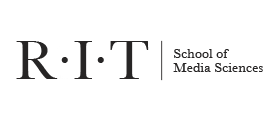MS Print Media Curriculum

March 8th, 2015, by Hayden Wagner
School of Media Sciences – MS Print MediaThe School of Media Sciences is a world authority in the management, production and distribution of content through platforms including print, web, mobile and social media. Our programs focus on leadership and project management.
Boasting one of the highest placement rates in the field, the School of Media Sciences places graduates in graphic communications and related industries. School of Media Sciences graduates are prepared as future industry leaders through their experiences in the management of communication processes, business operations, and product development.
CurriculumThe program requires 36 semester credit hours of study and includes six core courses, four electives, and a thesis. The curriculum exposes students to the foundations of the industry with a research focus. The program takes full advantage of RIT’s innovative and cutting-edge resources by placing students in an integrated environment containing the latest equipment and software used throughout the industry. You will find the course offerings and faculty expertise in our program are quite diverse.
ElectivesElectives are comprised of selected courses offered by the College of Imaging Arts and Sciences or other RIT colleges. In addition to Print Media electives, students can take graduate elective courses from a variety of disciplines at RIT such as business, packaging, imaging science and communication.
ThesisPrint Media graduate students work with expert faculty and focus on a particular area of thesis research in areas including content management, publishing workflows, typography and layout, business trends, color management, and applications of printing. Faculty work with the graduate students to customize their electives in a way that will lead them into thesis research that will help them in their prospective career path.
Along with three semesters of course work, each student completes research and a written thesis. Courses in the graduate program combine theory and application, providing graduate students with information about current industry trends, problem solving and research skills.
Required Courses: Materials and Processes in PrintingThis course offers a survey of the materials and processes used in print reproduction. Students will learn the basic theory of image reproduction embodied in the available analog and digital printing processes, and learn to identify the process origins of print samples. Additionally, students will learn the chemical and physical properties associated with consumables in order to obtain an understanding necessary to make informed decisions about use and application.
Tone and Color AnalysisThis course covers fundamentals of color measurement, color management system, and color reproduction technology for color matching and color image reproduction. Emphases are placed on CIE colorimetry, device calibration and characterization, and color management systems.
Operations Management in the Graphic ArtsAn in-depth study of the factors affecting the efficiencies and effectiveness of print media organizations and ultimately their profitability. Includes consideration of both internal factors, such as quality level goals, training, scheduling, plant layout, and financial management, and external factors, such as environmental and legal issues and safety enforcement.
Cross Media WorkflowThis course is designed to expose students to all the elements needed to master a cross media publishing project. Students will learn concepts and laws around copyright as it applies to cross media publishing. Concepts and tools necessary for the implementation of a cross media workflow will be discussed and reinforced with hands-on exercises. Additionally, ways companies create and utilize cross media workflows will be studied. Emerging industry and ISO standards as well as best practices for each of the fields discussed in the course will be presented.
Research Methods and Trends in Graphic MediaThe course provides a foundation for conducting scientific research in the graphic communications industry. Students will learn the scientific method, how to generate a hypothesis or research question, conduct secondary research, select the best research design to answer the research questions, and how to analyze basic survey data. The course will also introduce students to the current issues in the industry in preparation for them to identify a thesis or capstone project problem.
Statistical Analysis and Decision MakingThis is a course in applied statistics emphasizing an understanding of variation and inference (estimation and testing). Topics to be covered include: review of descriptive statistics, normal distribution, sampling distributions, estimation, test of hypothesis for single and two populations, analysis of variance (ANOVA), linear regression, multiple regression and model building. Students will apply these concepts using mini-cases and problem sets that involve both structured and unstructured data sets. The application of appropriate tools will be required.
Elective Courses:Below is a selection of elective courses offered to graduate students in the School of Media Sciences. Students in the MS Print Media program can also take graduate electives from other disciplines at RIT.
Advanced Color ManagementThis course embraces ICC-based color management practices by assessing color reproduction quality quantitatively and psychometrically. It also examines state-of-the-art tools, procedures, and techniques for device calibration and color control. Students are expected to work in a team environment, to plan, conduct experiments, and to publish a technical publication. (PPRT-602 Tone and Color Analysis)
Digital Content ManagementThis course addresses digital content management through the exploration of media organization and structure. Students learn how to use the structure of digital content to deploy and style for various publishing solutions. This course will focus on understanding and analyzing digital content solutions as they apply in various business models.
Implementing Media Business ChangeThis course provides the knowledge required to improve a graphic communication business. Students gain an understanding of the business assessment process and the knowledge to apply analysis and decision-making skills to engage in implementing change in the Graphic Communications Industry. Students learn how to evaluate a firm’s economic, operational, and market positions and to apply practical solutions to improve business practices, operations, resource allocation, and services model.
Industry Issues and TrendsThis course presents a detailed analysis of the critical trends and issues related to the graphic communication industry. It provides an in-depth analysis of key technologies as well as business, environmental and regulatory issues. This course provides a capstone experience that contributes to the student’s fuller understanding of changes in graphic communication constituencies and their role within the industry. By tracing historical roots, analyzing present issues and detailing future trends, students are prepared develop insights into the nature and scope of the major challenges facing industry leaders and how to manage these challenges.
Package PrintingThis course introduces students to the package printing industry. Printing processes, materials, production workflows and quality control systems used in package printing will be introduced. Students will take several packages from creation to final printed product.
Transmedia PublishingTransmedia Publishing is a form of multimedia communications that tells stories from a database of media assets. It differs from conventional publishing in that the reader dynamically participates in shaping the story and the story is adapted to the channel used to distribute it. Students create stories through the application of the theoretical principles, methods and tools employed in transmedia publishing and storytelling.
Typography ResearchThe course builds on fundamentals and skills taught in introductory and advanced typography courses by developing methods of investigation, research, and analysis, with the goal of enabling students to conduct independent research. Students will choose individual typographic topics to research (e.g. technology, psychology, history, aesthetics, imaging, writing systems, culture, and society). Course lectures survey these topics. Students each give presentations on their topics and prepare a written a report. The course emphasizes individual initiative and seminar participation.






Connect with Us